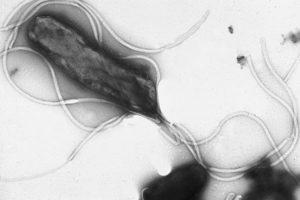
Electron micrograph of H. pylori possessing multiple flagella (negative staining. Yutaka Tsutsumi, M.D., Wikimedia, Commons.
Helicobacter pylori is a bacteria that resides in the gut and is well known for its association with gastric ulcers, gastritis and gastric cancer. Recent studies highlight beneficial effects of H. pylori infection against the development of some chronic diseases, such as asthma. Researchers aimed to determine the therapeutic effect of H. pylori, against house dust mite (HDM) induced allergic airway inflammation.
Murine studies have shown that neonatal exposure to H. pylori or bacterial extracts from H. pylori can be beneficial and result in reduced allergic airway disease. Beneficial effects of H. pylori have been attributed to the induction of tolerogenic Dendritic Cells (DCs) and regulatory T cells (T-regs) in an IL-18 and IL-10 dependent mechanism. However, these studies measured the effect of H. pylori as a prophylactic and not a therapeutic.
Van Wijck et al., observed a reduction in allergen-specific IgE and IgG1 serum levels, allergen induced lung inflammation and airway mucus production in response to H. pylori extract treated mice compared to control mice sensitized with HDM. Treatment with H. pylori extract also resulted in reduction of the ratio of CD11b+ (pro-inflammatory)/ CD103+(tolerogenic) DCs, as well as reduction in ability of DCs to present antigen.
This research highlights the novel use of H. pylori extract as a therapeutic agent for asthma. Researchers showed that this effect is mediated by reduction of proinflammatory CD11b+CD64+ DCs and antigen presentation capacity of DCs in the presence of H. pylori extract. However, further studies are required to determine what other immune modulatory effects are associated with H. pylori treatment of allergic airway disease.
Journal Article: Van Wijck et al., 2018. Therapeutic Application of an Extract of Helicobacter pylori Ameliorates the Development of Allergic Airway Disease. Journal of Immunology
Journal Article by Cheleka AM Mpande











